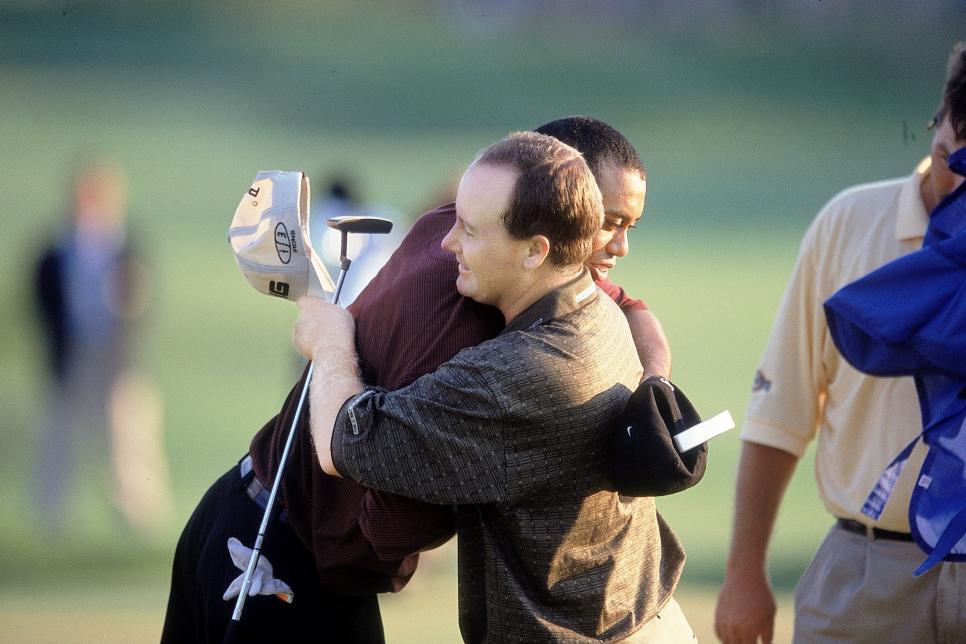News
Why do some players never make it past very good? Our latest podcast explains

John Biever
Twenty years ago, on the biggest stage possible, a 31-year-old journeyman stood toe-to-toe with a golfer playing the game better than anyone ever has.At the 2000 PGA Championship at Valhalla Golf Club, little-known Bob May holed a 15-foot, double-breaking birdie putt on the 72nd hole for a final-round 66. That forced his playing partner that day, Tiger Woods, to make a slippery six-footer for a birdie of his own to get into a playoff.
Woods made his putt, and won the playoff, and his next two starts, and the next year’s Masters for his fourth major in a row, and nine more major championships and 54 more PGA Tour events after that. May, on the other hand? He never won another golf tournament of any significance and spends the majority of his time in Las Vegas, giving lessons and hoping to Monday qualify his way onto the Champions Tour.
So, how does that happen? How does a player play like that one week, then fade to the abyss shortly thereafter? May’s career path is a case-study in the razor-thin margins in professional golf.
The latest episode of Local Knowledge, the Golf Digest podcast that takes a deep dive into the most compelling stories in golf, zooms in on those invisible-to-the-eye margins.
Sure, there are some freak-of-nature guys who are just physically better than everyone else. Tiger Woods. Rory McIlroy. Phil Mickelson. But for the vast majority of guys who aren’t unicorns, it’s about confidence. Belief. Luck. And cockiness.Yes, cockiness. In sport, it’s generally viewed as a negative trait. But in golf, the right kind of cockiness is an asset.
“Any good player has a little bit of arrogance in them,” May says. “ I had plenty of that growing up. But when I went in, a lot of the guys I was playing with were my idols. And, you know, I had respect for them. But I didn’t go, like, ‘I played my way out here now.’ I respected them, but you don’t have to act like it when you’re out on the golf course in then.
This week at TPC Harding Park in San Francisco, 18 club professionals will tee it up against the best tour pros in the world. On the surface, their games won’t look too different—300-yard drives and laser-like irons and terrific short games. Surely some of the club pros might even put on more impressive practice-tee displays than the tour pros.
“I played with Brendon Todd when I was on the Nationwide Tour,” says Danny Wax, a former touring professional who gave it up in his mid 20s to become an app developer.“You’d think he was a 6-handicap hitting balls on the driving range.”
He’s not a 6-handicap—he’s a three-time PGA Tour winner. The difference between the good and the great, it doesn’t appear to be that large.
The leader boards often tell a different story. Alex Beach knows this. A teaching pro out of Westchester Country Club in New York, he won last year’s PGA Club Pro National Championship to get into last year’s PGA…where he missed the cut by 12. He’ll get another crack against the world’s best at TPC Harding Park later this week.
“What are they doing that I’m not?,” Beach said. “I hit it just as far, if not further than most these guys. So, check. I can work it both ways, I have a very creative mindset, my short game is pretty good, I can get up and down from just about anywhere. Check.”
But as anyone who has played competitive, stroke-play golf knows, doing those things and doing those things under pressure are two very different things. But he doesn’t really feel pressure against the club pros, because he knows he’s beaten them before.“I need to take that mentality that I have at the club pro level, to the Tour level, and everything will be great.”
SUBSCRIBE TO LOCAL KNOWLEDGE: APPLE PODCASTS | GOOGLE PLAY | SPOTIFY

